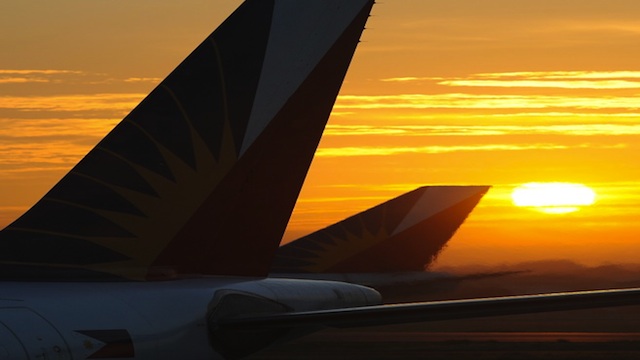SUMMARY
This is AI generated summarization, which may have errors. For context, always refer to the full article.

MANILA, Philippines – President Benigno Aquino has signed Republic Act 10374, the law the exemption of foreign carriers from the Common Carriers Tax (CCT) in a move to increase tourist arrivals.
The law will exempt international flights from paying the CCT, which is equivalent to 3% percent of the airline’s gross turnover and the Gross Philippine Billings Tax (GPBT), which is 2% of the gross turnover, provided that their home countries give the same tax exemption to Philippines carriers.
Aquino signed the law in Davao on Thursday, March 7, during his Team PNoy sortie.
In January, Senator Franklin Drilon said that once the Presdident has signed this law it will take effective 15 days from the day of publication.
The lack of direct flights to and from Europe because of this tax has had a direct impact on tourist arrivals into the Philippines as 99% of tourists arrive in the country by air.
In April 2012, the Philippines lost its last direct flight to Europe after the airline operating it left because of high taxes. Air France-KLM scrapped its Manila-Amsterdam route, saying it was “absolutely not happy” with the regulatory environment in the Philippines.
All other foreign airlines have ceased their direct flights to Europe years ago, also citing the punitive taxes that did not make economic sense for them.
The Philippines currently has only six million seats available with about 369 flights weekly. This is the second lowest in Asia just ahead of Cambodia. According to the Pilippine Travel Agencies Association (PTAA) both CCT and GPBT carries a 5.50 percent tax on airlines that translates to P2.50 billion in revenues for the government. Revenue losses from the CCT and the GPBT will be replaced by 20 million seats by 2016 and lower airfares by at least 8 percent.
This new law was signed just as the Philippines achieves one of the steps in the process to upgrade the industry regulator’s rating in global safety standard. The recent positive audit findings of the International Civil Aviation Organization (ICAO) may lead to the lifting of Europe’s ban against Philippine carriers.
Tourism boost
A statement released by the The Department of Tourism (DOT) on Thursday March 7 says it welcomes the President’s signing into law the rationalization of the CCT.
“This will certainly help improve and enhance the country’s competitiveness in the international travel arena. May this enhancement serve as an invitation to international air carriers, especially those covering long-haul routes, to make the Philippines a part of their primary route offering to the world and one of their major and exciting destinations,” DOT said.
The PTAA president, John Paul Cabalza said he sees leading international carriers, Cathay Pacific, Delta Airlines, Etihad, KLM, Kuwait Airlines, Lufthansa/Swiss Airlines, Qatar Airlines and Singapore Airlines adding more flights into the country by the middle of this year.
This is just one of the reform measures being undertaken by the Aquino Administration and the DOT, in coordination with other agencies, in improving market access and connectivity to the Philippines as it moves towards the achievement of 10 million foreign visitor arrivals by 2016.
This announcement will also help improve the country’s 82nd ranking out of 140 countries in the latest World Economic Forum (WEF) 2013 Travel and Tourism Competitiveness Index released on Thursday, March 7.
“The Philippines is the most improved country in the region, ranking 16th regionally and 82nd overall, up 12 places since the last edition,” the WEF said. “Government spending on the sector as a percentage of GDP (Gross Domestic Product) is now 1st in the world, and tourism marketing and branding campaigns are seen to be increasingly effective.” – Rappler.com
Add a comment
How does this make you feel?
There are no comments yet. Add your comment to start the conversation.